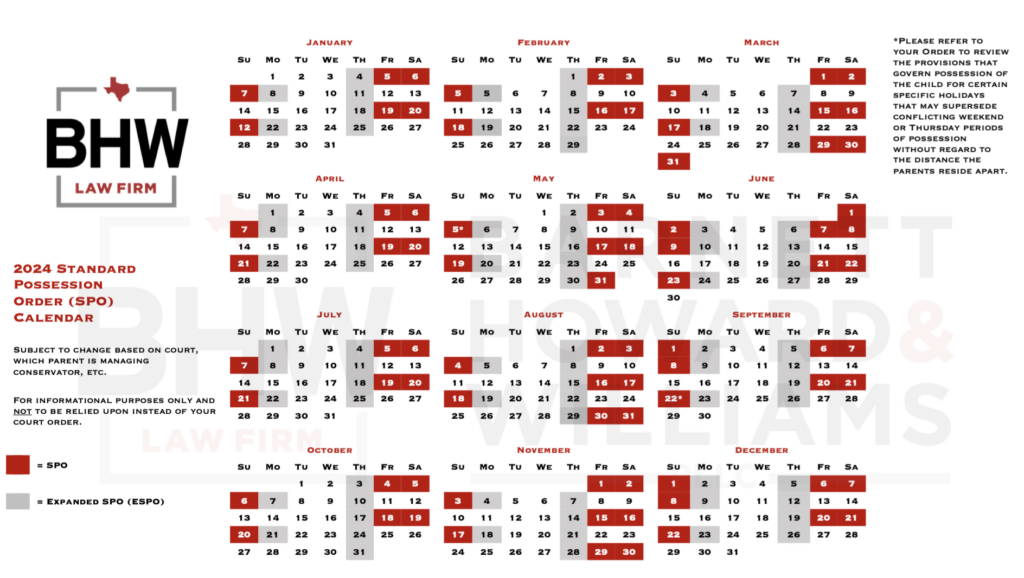Which Parent Gets Custody? The Standard Possession Order for Child Custody in Texas
 When parents in Texas divorce or separate, one of the most important issues they face is child custody. Texas law recognizes two types of custody: physical custody, which refers to where the child lives, and legal custody, which refers to the right to make decisions about the child’s upbringing. In cases where parents cannot agree on custody arrangements, the court may order a standard possession order.
When parents in Texas divorce or separate, one of the most important issues they face is child custody. Texas law recognizes two types of custody: physical custody, which refers to where the child lives, and legal custody, which refers to the right to make decisions about the child’s upbringing. In cases where parents cannot agree on custody arrangements, the court may order a standard possession order.
A standard possession order is a court-ordered schedule that determines when each parent will have physical custody of the child. The order is designed to provide regular and predictable time for both parents to spend with the child. In Texas, the standard possession order is governed by the Texas Family Code, and it provides a default schedule that can be modified by agreement of the parties or by the court if certain circumstances exist.
Under the standard possession order, for parents residing within 50 miles of each other, the non-custodial parent (referred to as the “possessory conservator” in Texas) has the right to possession of the child on the first, third, and fifth weekends of each month, starting at the time school is dismissed on Friday and ending at the time school resumes on Monday. In addition, the possessory conservator has the right to possession on mid-week during the school year from the time school is dismissed on Thursday until the time school resumes on Friday morning.
The standard possession order, for parents residing within 50 miles of each other, also provides for the possessory conservator to have the child for 30 days in the summer, which can be broken up into two periods of at least seven days each. The order also provides for the possessory conservator to have the child on alternating holidays, such as Thanksgiving, Christmas, and spring break. The exact dates and times for each holiday are specified in the order.
Printable Standard Possession Order for 2024. CLICK HERE
Does the SPO Apply if the Parents Live Too Far Away?
In cases where the parent lives more than 50 miles but less 100 miles apart, the non-custodial parent (referred to as the “possessory conservator” in Texas) has the right to possession of the child on the first, third, and fifth weekends of each month, starting at 6:00 pm on Friday and ending at 6:00 pm on Sunday. In addition, the possessory conservator has the right to possession on Thursdays during the school year from 6:00 pm to 8:00 pm.
In cases where the parents live more than 100 miles apart, the standard possession order provides for additional periods of possession to ensure that the non-custodial parent has meaningful time with the child. For example, the non-custodial parent may have the right to possession on one weekend per month instead of the first, third, and fifth weekends. You
should consult with your family law attorney to determine whether this distance consideration impacts your situation.
Can the Standard Possession Order be Modified?
It’s worth noting that the standard possession order is just that – a default schedule that can be modified by agreement of the parties or by the court. Parents who are able to work together to create a schedule that works for their family may be able to deviate from the standard possession order. However, if the parties cannot agree, the court will likely order the standard possession order.
Overall, the standard possession order provides a predictable schedule for both parents to spend time with the child. While it may not work for every family, it is a useful starting point for parents who are unable to agree on a custody schedule.
An Experienced Divorce and Child Custody Lawyer Can Help Determine When Each Parent Has Possession of Their Child
Most of the time, it is best to contact an experienced family law attorney to help explain and establish each of these possession schedules, including any customizations or unique provisions the court finds to be in the best interest of your child. You are often not limited to the standard and expanded standard schedule above–but you may need an experienced attorney to fight for you to have more time with your child. Let our experienced family law attorneys assist you in discussing this schedule with the other parent and the court. Contact BHW Family Law at (817) 993-9249 for a free consultation of your family law matter.








